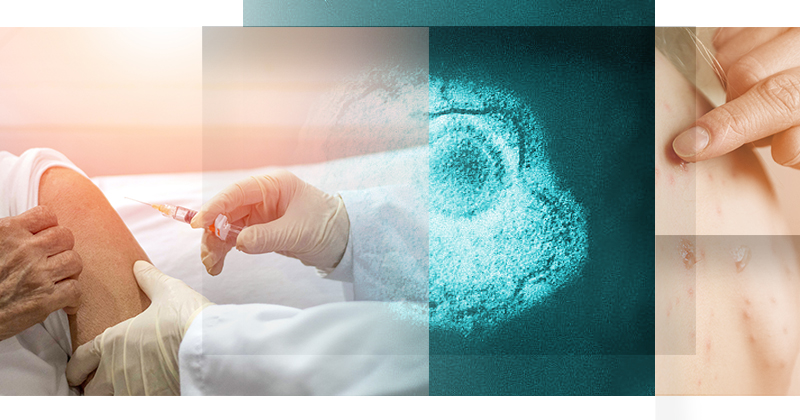


Beyond preventing shingles
Photo by Kathy F. Atkinson | Illustration by Jeffrey C. Chase October 15, 2024
Epidemiology researcher leads UD team’s study on Shingrix’s impact on dementia, stroke in nursing homes
People who get chickenpox at a young age are susceptible to shingles. The highly contagious illness, caused by the varicella-zoster virus, remains dormant in the nervous system for years, where it can reactivate, causing shingles. The highly neuroinflammatory disease caused by herpes zoster (HZ) virus triggers a painful, itchy rash that’s more common in older adults, according to the Mayo Clinic. Shingles can also cause stroke and other adverse neurological conditions. Some studies have also identified potential associations with dementia.
Daniel Harris, an assistant professor of epidemiology who joined the University of Delaware College of Health Sciences faculty this fall, is taking a closer look at the relationship between the risk of dementia and shingles in older adults. He’s studying a cohort of three-and-a-half million nursing home residents, admitted between 2017 and 2022, from across the United States to determine whether there’s a difference in the risk of dementia between people who complete the two-dose series of the Shingles vaccine known as Shingrix, and those who don’t receive the vaccine, which is not required among nursing home residents.
The GlaxoSmithKline (GSK) funding will allow Harris, site principal investigator, and Stefan Gravenstein, principal investigator at Brown University and the Veterans Health Administration, to emulate two target trials using observational data. Harris will examine GSK’s Shingrix in its real-world effectiveness in preventing herpes zoster (HZ) infection, while estimating the vaccine’s effectiveness in preventing incident dementia and other adverse cognitive and neurological events, including stroke.
“If a precursor to incident dementia is neuroinflammation and stroke, if you have a stroke, it’s a strong predictor for vascular dementia,” explained Harris. “If that can be prevented in a healthy brain, it can arguably prevent a new dementia case later in life.”
Neurological changes involving dementia, however, can start in a person in their 40s or 50s, with symptoms manifesting at a later age.
“For those who show early neurological changes of dementia but are asymptomatic, could a shingles infection accelerate dementia progression through increased neuroinflammation and potential other adverse events like stroke?” asked Harris. “Preventing shingles through vaccination may, therefore, be one strategy to slow dementia progression in those exhibiting underlying neuropathology of dementia.”
The industry-funded study enabled Harris to access a robust data set, including electronic health records (EHRs) for all nursing homes serviced by PointClickCare.
“This data include many years of labs, medication administration, and orders for three million nursing home residents that we can then link to administrative claims,” said Harris. “So, if a nursing home resident gets admitted to a hospital or a rehabilitation center, we’ll know about their care.”
Obtaining that kind of proprietary health data is rare but not a first for Harris, who recently published research in the journal Frontiers of Public Health on inequities in COVID-19 testing access and variant impact after gaining access to Walgreens’ COVID-19 testing database.
Harris’s latest study would not have been possible without GSK as a partner in this population health research.
“GSK’s scientific division is very interested in getting the right answer—the truth,” he said. “They are invested in this vaccine. Additionally, there’s a lot of regulatory pressure on them, so they must make supported claims.”

A tandem study
Harris’ colleagues at Brown University, including Gravenstein, a geriatrician and professor of health services, policy, and practice, who also serves as the associate director of the Center on Innovation in Long-Term Services and Supports at the Providence Veterans Administration Medical Center, are also conducting analyses using 60,000 Veterans Administration (VA) health records as part of the overall study.
“They have even more comprehensive data,” said Harris. “If a person enlists in the military at age 18 or in their twenties, their health record is longitudinal and includes all lab records and outpatient visits.”
But he cautions, “It has limitations. Veterans and servicemembers are predominantly male, and it’s a generally less healthy cohort on average.”
Estimates from both studies will be merged through meta-analysis to do the question justice.
“This is yet another innovative example of using big data for population health,” said Harris.
A prediction
In his nursing home cohort, Harris is predicting a reduction in stroke and in more severe neurologic adverse events in residents who were vaccinated with Shingrix versus those who are unvaccinated. He’s also anticipating a modest reduction in incident dementia risk.
“I’m optimistic and believe Shingrix will also be effective at reducing shingles and its sequelae, especially with how effective the vaccine has shown to be in other settings,” said Harris.
Harris hopes this study and its findings increase awareness of the benefits of shingles vaccination in older adults, especially those living in nursing homes, who are at greater risk of stroke and other adverse effects of shingles. The study also has broader research and public health implications.
“Vaccines have the potential to do more than just prevent the infection they’re designed to prevent,” he said. “If we prevent the infection, then we can also avoid the devastating downstream effects of that infection.”
“Similarly, while the COVID-19 vaccine effectively reduced COVID, it also reduced pulmonary embolism, so this is one exploration into that for Shingrix.”
Contact Us
Have a UDaily story idea?
Contact us at ocm@udel.edu
Members of the press
Contact us at 302-831-NEWS or visit the Media Relations website

